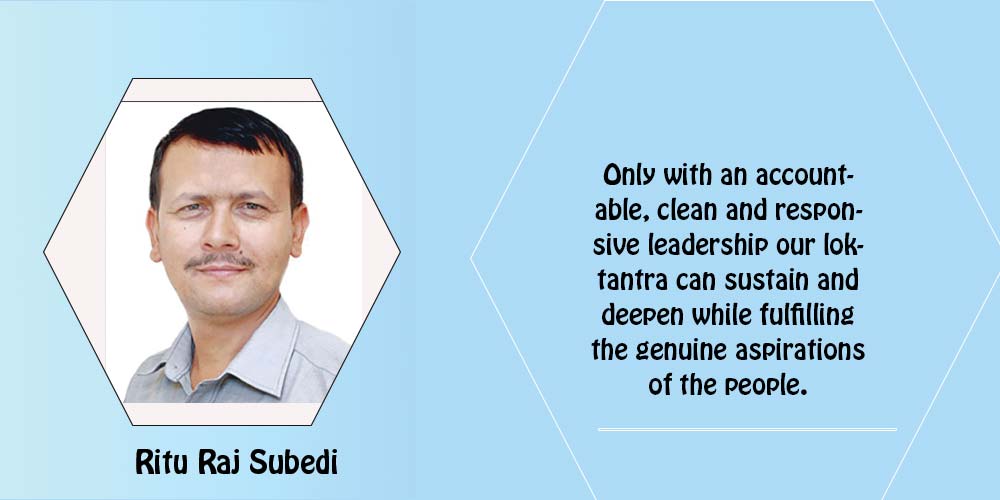- Friday, 20 February 2026
What Ails Our Loktantra ?
More than 18 years have elapsed since democracy was reinstated in 2006 following the collapse of king Gyanendra’s 14-month direct rule in the country. The April Uprising that is also called Janaandolan-II (second people’s movement), paved the way for the transformative structural changes. The Himalayan nation was converted into a secular, federal republic, abolishing the 204-year-old monarchy. The new constitution promulgated through the Constituent Assembly (CA) consolidated these landmark achievements.
With this epochal upheaval, Nepali political parties began to use the term ‘loktantra’ instead of ‘prajatantra’ though both the words denote the same thing – democracy. However, the word ‘prajatantra’ is more popular than ‘loktantra’ in Nepal. This writer often wonders why the Nepali leaders prefer to use the word ‘loktantra’ that is widely used by Indian politicians.
Negative connotation
One reason may be a slight negative connotation of ‘prajatanta’ that comprises two words – praja (subjects) and tantra (rule). In the feudal society, especially during the Rana regime, praja signified raitis, who are far below in social hierarchy in terms of power and economic status. Our bunch of leaders saw its connection with king and kingship against which they fought for decades. The literal meaning of ‘lok’ is folks but ‘praja’ stands for ‘demos’ (people) and has broader theoretical underpinning and collective conscious of the Nepalis. The term ‘prajatantra’ was main lexicon for the parties as they spearheaded crusade for the introduction of multiparty democratic system in 1951 and 1990. It was on the lips of every political activists fighting for democracy and civil liberties.
Words are apparel of ideas created within given socio-cultural context. Certain terms carry the narratives of dominant classes and are often in circulation. One may argue that adoption of ‘loktantra’ in place of ‘democracy’ reflects an Indian influence in the Nepali politics. But whatever the factors behind this, a million-dollar question is: Is the loktantra that we, Nepalis, have been practicing true to its essence? Perhaps not. Our democracy has not become what Lincoln defines it as - ‘Of the people, by the people, for the people.’ This has turned into a sort of musical chair among a handful of leaders, who stick to power by fair means or foul.
Do our leaders have time to make an appraisal of how the loktantra is working and benefits the masses? There was a hope that the political leadership will rectify their erroneous deeds and start afresh so that the fruits of development reach nooks and corners of the country. Good governance, easy access to quality health services and education, employment opportunities and social security are the expectations of Nepalis but these are still a distant dream for them. The parties and their leaders often reiterate building a socialism-oriented economy and bringing prosperity. Are there concrete works in this direction?
In order to create socialism-oriented economic system, the focus must be on manufacturing sector that generates jobs and enough taxes, enabling to establish real economy essential for the welfare state. There is also an utmost need to regulate neo-liberal free market economy that has only given rise to the birth of comprador class, which maintains nefarious nexus with the ruling elites. Unlike what we have expected, youths do not see their future in their native land and opt going abroad either for work or study.
Every day around three bodies of Nepalis land in Tribhuvan International Airport (TIA) that mock our much-hyped polity and economy. Thousands of Nepali migrant workers have already died while working in inhospitable conditions in the foreign lands. According to the latest data of Nepal’s Department of Immigration, around 4,400 youths leave for abroad on a daily basis. 'In' 2023 alone, altogether, 800,000 Nepalis flew to various labour markets for better job prospect and 70,915 abandoned the country for permanent settlement abroad. Likewise, 92,349 Nepalis, who have secured permission for temporary stay from different countries, also bade adieu to the motherland.
Economists and policy wonks praise the inflow of remittance, sent by Nepali workers back home, as lifeline to the national economy but this financial gain pales in comparison to the loss of lives as well as social costs arising from foreign employment. This reminds us of the practice of feudal aristocrats who used to make fast buck and ruled the nation by dispatching the youth to serve in the foreign military powers. Rana prime minister Juddha Shumsher had offered a contingent of 8,000 troops for garrison duty in British India in 1939 on the eve of World War II. In return, the British colonial regime provided hefty amount of money to him for the loyalty.
Powder keg
It seems even under the democratic set-up, the elite group has fattened up off the sweats and blood of youths toiling abroad. By sending youths to foreign soil, there are two advantages for the ruling class – first, the money they send to the homeland keeps the economy running. Second, this helps avoid potential social and political unrest because the unemployed youths are the powder keg that can explode anytime on a slightest pretext.
Our loktantra should instil people’s faith in the capacity of the state to deliver governance, democratic order, security, employment, goods and services to them. Unfortunately, it has to bear the burden of managing the scores of cadres, cronies and relatives of the leaders because there is no productive economy that can meaningfully engage them. Only with an accountable, clean and responsive leadership our loktantra can sustain and deepen while fulfilling the genuine aspirations of the people.
(The author is Deputy Executive editor of this daily.)

















